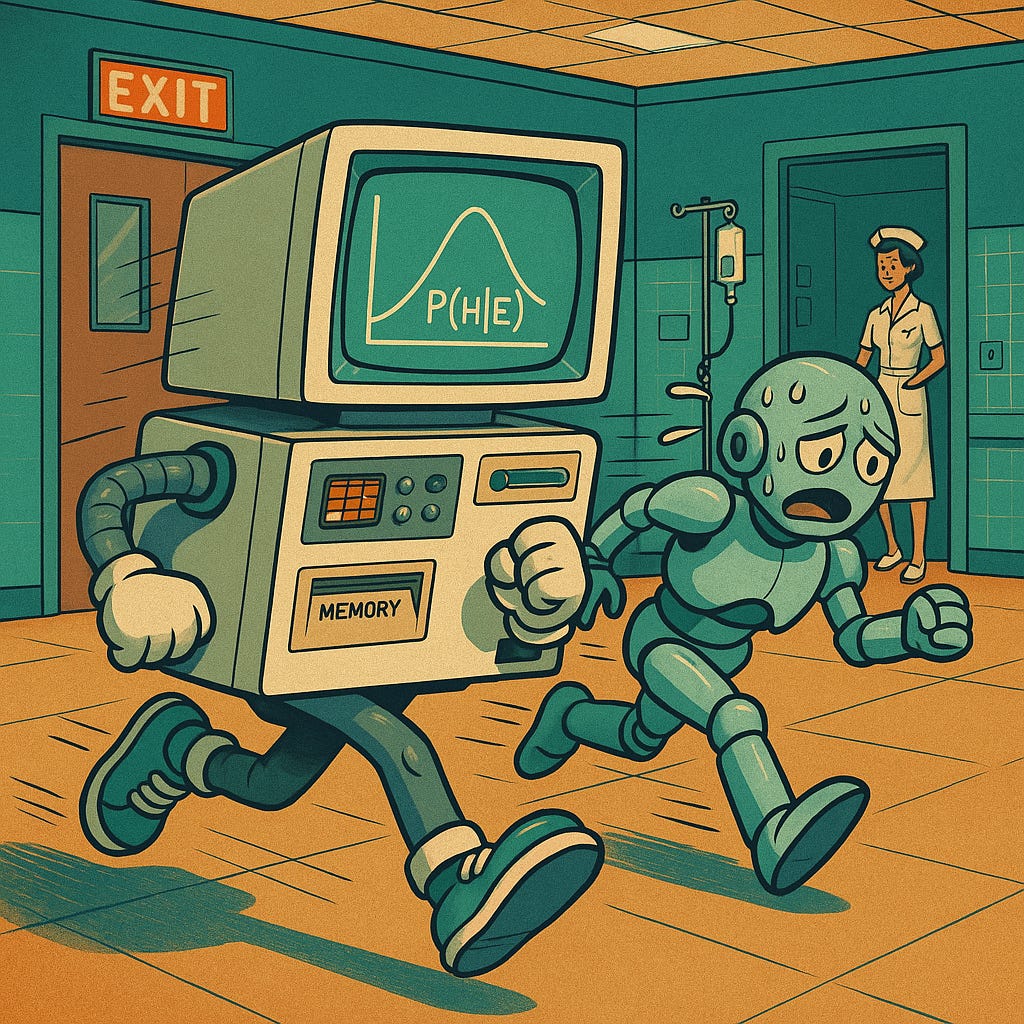How a 1980s Expert System Continues to Outperform Modern LLMs in Diagnostic Accuracy
Lessons from DXplain and the Future of AI in Medicine
Summary:
This article explores the application of Bayesian logic in clinical decision support systems (CDSS), focusing on DXplain—a system developed in 1984 at Massachusetts General Hospital. We examine how DXplain's probabilistic reasoning framework enables it to generate accurate differential diagnoses and compare its performance to contemporary large language models (LLMs) like ChatGPT and Gemini. Despite advancements in AI, DXplain demonstrates superior diagnostic accuracy, highlighting the enduring value of Bayesian approaches in medicine.
Introduction
In the rapidly evolving landscape of artificial intelligence (AI) in healthcare, large language models (LLMs) have garnered significant attention for their potential to revolutionize clinical decision-making. However, amidst this enthusiasm, it's crucial to recognize the enduring efficacy of traditional expert systems grounded in Bayesian logic. One such system, DXplain, developed in 1984 at Massachusetts General Hospital (MGH), continues to demonstrate remarkable diagnostic accuracy, often surpassing that of modern LLMs. This article delves into the principles of Bayesian logic, the architecture of DXplain, and comparative analyses highlighting its performance relative to contemporary AI models.
Understanding Bayesian Logic in Clinical Decision Support
Bayesian logic, rooted in Bayes' Theorem, provides a mathematical framework for updating the probability of a hypothesis based on new evidence. In clinical settings, this translates to refining diagnostic probabilities as additional patient data becomes available. The theorem is expressed as:
P(H|E) = [P(E|H) * P(H)] / P(E)
Where:
P(H|E) is the posterior probability of hypothesis H given evidence E.
P(E|H) is the likelihood of observing evidence E if hypothesis H is true.
P(H) is the prior probability of hypothesis H.
P(E) is the probability of observing evidence E under all hypotheses.
In practice, Bayesian logic allows clinicians to integrate prior knowledge with current patient data, facilitating more accurate and personalized diagnoses.
DXplain: A Pioneering Bayesian-Based CDSS
Developed in 1984 by the Laboratory of Computer Science at MGH, DXplain was designed to assist clinicians in generating differential diagnoses based on patient findings. The system combines features of an electronic medical textbook with a diagnostic decision support tool, utilizing a knowledge base encompassing over 2,600 diseases and 5,700 clinical findings .
Key Features:
Interactive Input: Clinicians input patient signs, symptoms, and laboratory data.
Ranked Diagnoses: DXplain generates a ranked list of potential diagnoses, each accompanied by explanations and supporting evidence.
Educational Utility: The system serves as a learning tool, providing references and justifications for each suggested diagnosis.
DXplain's algorithm employs a modified form of Bayesian logic, assessing the frequency and importance of clinical findings associated with various diseases to calculate the likelihood of each diagnosis.
Comparative Performance: DXplain vs. Modern LLMs
Recent studies have evaluated the diagnostic accuracy of DXplain relative to contemporary LLMs such as ChatGPT and Gemini. In a study published in JAMA Network Open, researchers at MGH compared the performance of these systems across 36 patient cases. The findings revealed:
(sciencedaily.com, massgeneralbrigham.org, beckershospitalreview.com)
With laboratory data:
DXplain correctly identified the diagnosis in 72% of cases.
ChatGPT achieved 64% accuracy.
Gemini reached 58% accuracy.
Without laboratory data:
DXplain maintained a 56% accuracy rate.
ChatGPT's accuracy dropped to 42%.
Gemini's accuracy decreased to 39% .
These results underscore DXplain's robustness, particularly in scenarios with limited data—a common challenge in clinical practice.
Advantages of Bayesian-Based Systems in Clinical Settings
Bayesian-based systems like DXplain offer several benefits:
Transparency: They provide clear reasoning for each diagnosis, enhancing clinician trust and facilitating informed decision-making.
Adaptability: Bayesian logic allows for continuous updating of probabilities as new patient information becomes available.
Educational Value: Such systems serve as teaching tools, elucidating the rationale behind diagnostic suggestions.
In contrast, LLMs, while proficient in language generation, often function as "black boxes," offering limited insight into their reasoning processes.
Integrating LLMs and Bayesian Systems: A Synergistic Approach
While DXplain demonstrates superior diagnostic accuracy, LLMs excel in processing and generating human-like language. Combining these strengths could lead to more effective CDSS. For instance, LLMs could assist in extracting relevant information from unstructured clinical notes, which could then be analyzed by Bayesian systems like DXplain to generate accurate diagnoses. Such integration could enhance both the usability and reliability of CDSS .
Conclusion
The enduring success of DXplain highlights the value of Bayesian logic in clinical decision support. Despite the advancements in AI and the emergence of LLMs, systems grounded in probabilistic reasoning continue to offer superior diagnostic accuracy, particularly in data-limited scenarios. Moving forward, integrating the linguistic capabilities of LLMs with the analytical rigor of Bayesian systems could pave the way for more robust and trustworthy CDSS, ultimately enhancing patient care.
References:
Kim, H. (2017). Bayesian Logic in a Nutshell. Medium. Retrieved from https://medium.com/@h27kim/bayesian-logic-in-a-nutshell-5fc9c55a3deb
Massachusetts General Hospital Laboratory of Computer Science. (n.d.). DXplain. Retrieved from https://www.mghlcs.org/projects/dxplain
Mass General Brigham. (2025). Traditional Diagnostic Decision Support Systems Outperform Generative AI for Diagnosing Disease. Retrieved from https://www.massgeneralbrigham.org/en/about/newsroom/press-releases/traditional-diagnostic-decision-support-systems-outperform-generative-ai(mghlcs.org, massgeneralbrigham.org)
Note: This article is intended for informational purposes and should not be construed as medical advice. Clinicians should continue to rely on their professional judgment and consult relevant resources when making diagnostic decisions.


